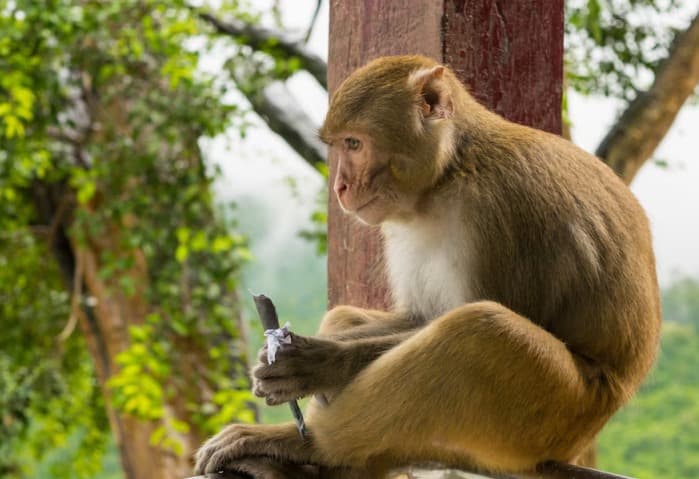Monkey ownership laws differ significantly worldwide, and it is crucial to be aware of your local regulations before considering a monkey as a pet. While some regions allow monkey ownership, others have strict restrictions or outright bans. Understanding these laws will help potential owners make informed decisions and ensure the well-being of both the monkeys and the community.
The Complexity of Monkey Ownership Laws
The legal status of owning a monkey can be a complex matter due to several factors. These factors include the species of monkey, conservation efforts, public safety concerns, and the potential for the illegal wildlife trade.
Consequently, laws regarding monkey ownership vary widely across different countries and even within different states or provinces of the same country.
Related: What Happens If My Dog Bites Someone on My Property?
Where is it Legal to Own a Monkey?
However, I can provide a general overview of regions where monkey ownership is commonly legal:
United States
In the United States, monkey ownership laws vary from state to state. Some states allow private ownership of certain monkey species, while others require special permits or outright prohibit ownership.
For example, in states like Alabama and Nevada, owning a monkey is generally legal. However, states such as California, New York, and Washington have stricter regulations, often requiring permits or restricting ownership to educational or scientific purposes.
Russia
Russia allows private individuals to own monkeys as pets, but it is subject to licensing requirements and adherence to health and safety regulations. Prospective owners must demonstrate their capability to provide adequate care for the primates before obtaining a license.
Mexico
Mexico allows private ownership of monkeys without specific restrictions. However, it is advisable to consult local regulations and consider the welfare of the animal before proceeding with ownership.
Thailand
Thailand allows the ownership of monkeys, but permits may be required, particularly for certain species. It is essential to research and comply with local laws to ensure legal ownership.
United Kingdom
The United Kingdom has stringent laws regarding monkey ownership. Monkeys are classified as dangerous wild animals and can only be kept with a license issued by local authorities. The licensing process involves meeting strict criteria to ensure the welfare and safety of both the animal and the public.
Australia
Australia prohibits private ownership of primates as pets. This ban aims to protect native wildlife and prevent the introduction of non-native species that could disrupt ecosystems.
Canada
In Canada, owning a monkey is generally restricted. Certain provinces may allow private ownership under specific conditions, while others prohibit it altogether. It is important to consult local regulations and obtain necessary permits if applicable.
The Ethics of Monkey Ownership
While some individuals may desire to own a monkey out of affection and curiosity, it is crucial to consider the ethical implications.
Monkeys are intelligent, social animals with complex needs that can be challenging to meet in a domestic setting. Their natural behaviors may be compromised, and their mental and physical well-being may suffer. It is essential to prioritize the welfare of monkeys and consider alternative ways to appreciate and support their conservation.
Tips for Responsible Monkey Ownership
For those in regions where monkey ownership is legal and responsible ownership is possible, it is vital to adhere to certain guidelines:
- Extensive Research: Learn about the specific needs, behavior, and care requirements of the monkey species you are interested in before making a decision.
- Enclosure and Enrichment: Provide a spacious, stimulating, and secure enclosure that allows for natural behaviors and includes proper environmental enrichment.
- Veterinary Care: Establish a relationship with an experienced veterinarian who specializes in primate care and ensure regular check-ups and vaccinations.
- Diet and Nutrition: Offer a balanced diet that meets the nutritional needs of the monkey, consulting with experts or veterinarians to determine appropriate food choices.
- Socialization and Stimulation: Monkeys are highly social animals; provide ample opportunities for social interaction and mental stimulation to prevent boredom and loneliness.
FAQs
What are the risks of owning a monkey as a pet?
Owning a monkey as a pet comes with various risks. Monkeys can transmit diseases to humans, and their strong natural instincts can lead to unpredictable and potentially dangerous behaviors. Additionally, meeting the complex needs of a monkey in a domestic environment can be challenging and may negatively impact their well-being.
Can I adopt a monkey from a rescue center or sanctuary?
Yes, adopting a monkey from a reputable rescue center or sanctuary is a viable option for individuals interested in providing a home for a monkey. These facilities often prioritize the welfare and well-being of monkeys and can guide potential owners on responsible ownership.
How can I contribute to monkey conservation without owning one?
There are several ways to contribute to monkey conservation without owning a monkey. You can support organizations working on primate conservation through donations, volunteer work, or spreading awareness about the importance of protecting monkey habitats and supporting sustainable conservation efforts.
Conclusion
The legal landscape surrounding monkey ownership is diverse and constantly evolving. Before considering monkey ownership, it is crucial to research and understand the laws and regulations specific to your region or country.
Additionally, it is important to weigh the ethical implications and the ability to provide proper care and enrichment for these complex creatures. By doing so, potential owners can make informed decisions that prioritize the welfare of monkeys and ensure a responsible and legal approach to ownership.
